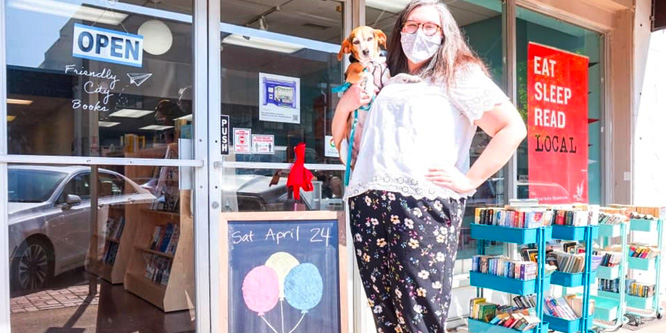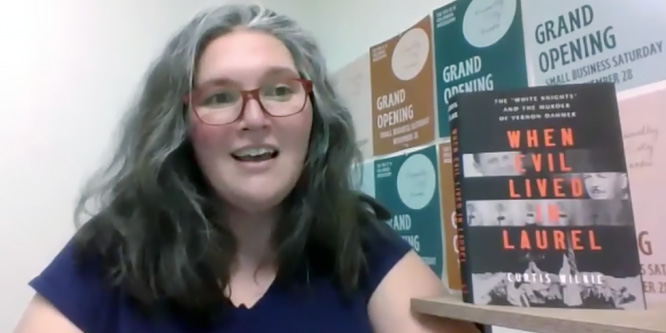
Photo: Friendly City Books, Columbus, MS
Have indie bookstores found answers to counter Amazon?
Independent bookstores had been making sales and market share gains prior to the novel coronavirus pandemic upsetting the cart in 2020. The last year has proven challenging for smaller retailers, however, as they have had to contend with forced shop closures while pivoting online to take advantage of homebound consumers’ increased interest in reading and buying from local merchants.
In-store sales fell 30 percent last year, according to Bookshop.org, an online platform for indie book sellers supported by the American Booksellers Association (ABA). Online sales, however, jumped 700 percent, helping to offset some of the damage of a down year.
Independent shops are slowly returning to a state of semi-normalcy as states have relaxed safety protocols with millions of Americans having been vaccinated against COVID-19. Bookstore sales, which were up nearly 130 percent year-over-year in May, were still down 9.2 percent compared to the same period in 2019.
Friendly City Books finished up 2019 with plans to open its store in Columbus, MS, in the second quarter of 2020. Emily Liner, founder and owner of the shop, told RetailWire that “the pandemic completely upended” her plans and that she “had no idea when or if a brick-and-mortar business would be feasible again.”

Ms. Liner said she took her business online on the Bookshop.org platform. It enabled Friendly City to begin selling books online without having to hold inventory or fulfill orders itself. The shop was eventually able to open on Nov. 28 of last year and has held its own since then.
Friendly City continues selling online “even as life starts returning to normal.” The shoppers that the shop finds online are the same as “having extras customers walk in the door,” she said.
Andy Hunter, founder of Bookshop.org, sees Amazon.com’s growing market share as an existential threat to small bookstores, authors and the publishing industry. He asserts that Amazon will account for 80 percent of the U.S. book market by 2025 if it is able to maintain an eight percent annual growth rate over the next four years. Mr. Hunter said slowing Amazon down is made more difficult as it uses loss leader pricing on the most popular titles, which make up an outsized percentage of the market.
Bookshop.org has around 1,200 bookshops on its platform and partners with 26,000 affiliates.
Discussion Questions
DISCUSSION QUESTIONS: Do you see Amazon or its bookstore rivals making greater market share gains over the next several years? What can independent bookstore owners do to compete with Amazon and larger retail chains?


Amazon will continue to dominate this category for many years to come. The independent bookstore business was permanently changed decades ago by Amazon, and the pandemic wasn’t helpful for independent book retailers. The fact is, independent book selling is a lifestyle business. These retailers can’t compete with Amazon and shouldn’t even try. They should focus on the unique store experience they alone create and serve their customers.
Physical bookstores have the power of “browsing,” while the online experience is one of “shopping.” As with most retail, physical stores need to heavy up on experiential elements and merchandising to draw people in. When’s the last time on a rainy Sunday, you cozied up with amazon.com?
Agree. The attraction of the independent bookstore is in the atmosphere, in the personalized service, and in the rarity (even one-of-a-kind) of the inventory. Couple all those factors with rainy days cuddled up with Amazon.com and one has the answer: brick-and-mortar wins out for indie bookstores.
Any shift to online sales will finally answer the question of whether the core appeal of the bookstore is the atmosphere or the inventory. If it is the atmosphere and cultural connection of enthusiasts it will survive. If it is unique inventory, that could easily be copied by Amazon if the market is large enough for it to challenge. The issues of valuing used inventory and core knowledge of literature can be solved with third-party sellers from the indie community. The 700 percent online growth of 2020 shows that is possible. Might be time to finally say goodbye to the corner book store — but I hope not.
Going to a bookstore is – and should be – a completely different experience from buying a book on Amazon. Booksellers shouldn’t try to compete with Amazon – they need to appeal to their core customers and focus on the experience.
I think it’s wrong to think of Amazon as a “bookstore” anymore. They still dominate the market, especially for casual book buyers and e-books. There’s no way the independents can compete with that. But for hardcore book fans, I believe they enjoy the experience of browsing a local book store, settling in with a cup of coffee and reading something new, or meeting authors and having discussions about new releases, or ideas for their next book, with someone who actually knows something about the subject matter. They’re in the community building business and, I believe post COVID-19, those experiences have become more important to more people. I expect to see independents continue to thrive in the near future.
Bookshop.org is certainly going to help. Allowing smaller bookstores to provide “extended shelves” will help keep their existing customers from “having” to go Amazon for a specific book, keeping them in their ecosystem.
Independents should be about the experience or destination more than the selling of books (it does remain important though). The unique experience is what will keep independents in the game with Amazon.
Amazon’s marketshare will continue to outpace its rivals for some time to come. Whether we like it or not it has several key advantages over the indie bookstores. Some of these are a huge selection, pricing policies, and that customers who go there to buy something can easy peruse its book selection while there.
I think we know that a brick-and-mortar bookstore is not just about books. It’s about an experience. Maybe it’s the experience of going through aisles and picking up physical books. Maybe it’s the coffee shop built into the store. Then there are special events and book signings. And there is a sense of “local.” There are plenty of ways to create an experience that allows an independent to survive, if not even thrive, alongside Amazon and other larger retail chains.
First of all, why is this an “either/or” question? If it is, that assumes the “pie” is fixed. But what if the “pie” is growing? Amazon will clearly continue to grow and so will great indie bookstores. With all due respect to my friend Ben Ball the right answer is, “inventory and atmosphere,” not, “inventory or atmosphere.” If you need the latest Stephen King novel at a deep discount, you’ll shop at Amazon. If you are looking for a curated browsing book buying experience, the indie store will win every time. Book Beat, my favorite indie bookstore, has an amazing selection of new and out of print art books, probably the best selection of children’s books I’ve ever seen (masterfully curated by one of the owners), and the latest avant-garde literature. Can you buy Stephen King there? Sure, but with all due respect to Mr. King, why would you? And that’s the point. Indie bookstores can offer advice, more targeted suggestions — of course with Amazon’s algorithms that’s not much of a trick, community events including book clubs, and yes, that whole wonderful browsing experience. The indie bookstores of today are best-in-class. They just need to keep faith with their consumer. Amazon will take care of itself.
It’s an “either/or” because of how the question was phrased (market share always adds up to 100%). But you’re right: if a store can escape — i.e. broaden — its narrowly defined category, go from being (just) a bookstore to a “knowledge store” or “literature store” or whatever, it may have found an out.
Indie bookstores have their own unique niche and are a part of the fabric and community in many downtown Main Streets. At this stage, Barnes & Noble and other leading chain bookstores have lost the battle against Amazon. There’s no question that Amazon will remain the dominant force in the bookselling arena for the foreseeable future.
However there is something magical and connective about going to your local indie bookstore and having an experience vs. receiving a package in the mail. There is plenty of room for indie bookstores to survive and thrive. They have a unique opportunity to build their business operating models around the experience and the discovery process of new books, authors, and other services.
These “rainy day,” “cuddle up” analogies? Sorry, but as sweet as some of these retail spaces may be: rain is what keeps customers away—and then online to shop while the bad weather plays out.
No, the ONLY things that will get registers humming at an indie bookstore (or one-off gift shop) are uniquely immersive and experiential. Yes, that means making sure yours is a place with a “personality” (yes, a lone store, likes its proprietor, can be individualistically run), caters to a very specific type of customer/neighborhood, and carries (and showcases) certain authors/artists. Which are precisely things that Amazon cannot do (except through sinisterly impersonal algorithms).
These singular brick-and-mortar operations can also have something of an online presence. But it must present its self in very singular — mystery tales or LGBTQ-centric — ways, too. Thus, you may be able to find those looking for something you might have winnowed down for them to easily procure — from farther away than down the street from your front door.
Your business will never be “big” in the excessive, impersonal sense. Yet you can seem large in the eyes of a small coterie. Which, hopefully, is why you got into this in the first place.
Amazon’s platform is so “search and transact” oriented that it leaves open space for the curation, atmosphere and service that physical bookstores provide. I think there is a lane for independents — especially in denser urban settings. Going online with a platform like Bookstore.org may not drive massive incremental sales volume, but it provides the high-caliber digital services expected by existing customers.
It seems like the question was phrased so as to facilitate some inspirational take — a la Frank Capra — but sadly (for everyone but Amazon’s shareholders) I don’t see that happening: Amazon will continue to gain share, just as it does in every category. It might be less of a gain in books than other goods, but that’s mostly because it had an early start in that field and is closer to exhausting opportunities.
Does this mean indies are dead? No: there will remain, perhaps forever (knock on wood), opportunities for stores that can specialize or bring some other kind of value proposition. But the traditional neighborhood or mall-based bookstore, who counted on the “browse and buy” walk-in business, is on the Endangered Species list.
Independent retail book stores will survive because shoppers like myself want to physically browse books before buying. Some books may be virtually browsed on Amazon, though. Ebay also is a good market for books. I have purchased innumerable books from indie stores, Amazon and Ebay, and directly from university publishers. Everyone says that brick and mortar stores provide personal service and an experience. Bunk. The store owner or associate usually does not know their stock that well and never knows what a particular customer wants. The only experience is indifference. Some owners stare at their customers, or feel that they owe them a living as entitlement. (Don’t leave here without a book.)
Maybe if stores regularly brought authors in for readings and signings and also hosted book discussions. Have sales! More remainder books at lower prices. Do special orders. Even offer snacks.